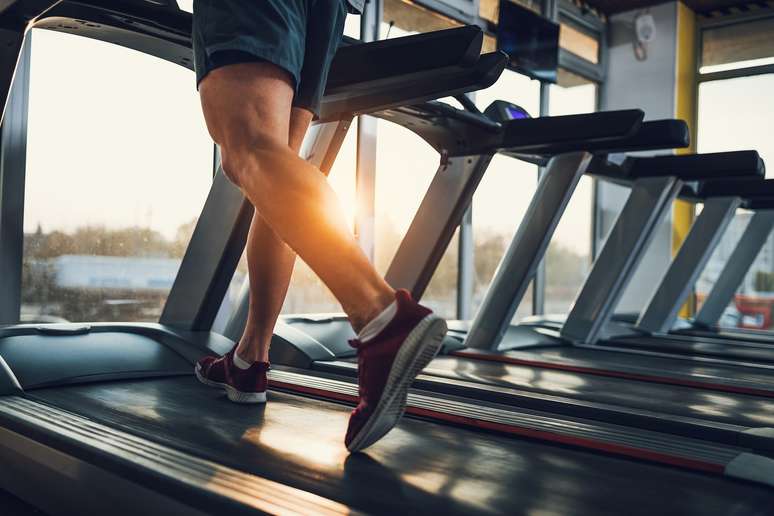Are there food groups that are more suitable for pre and post workout? Ask questions about nutrition and its contribution to exercise
Anyone who wants to start a training routine or is already in the habit of going to the gym and playing sports knows that nutrition and rest play a fundamental role in a healthy lifestyle. healthy life and, of course, achieving personal goals, from losing weight to gaining muscle mass.
A recent survey indicated that approx 21% of the Brazilian population goes to the gym, which makes it the second in the world, and in a certain sense the number confirms another widespread fact that indicates Brazil as the deputy world leader in terms of number of gyms, second only to the USA.
html[data-range=”xlarge”] figure image img.img-f442163a2e0318d2780d146700ef872di1rzdmon { width: 774px; height: 516px; }HTML[data-range=”large”] figure image img.img-f442163a2e0318d2780d146700ef872di1rzdmon { width: 548px; height: 365px; }HTML[data-range=”small”] figure image img.img-f442163a2e0318d2780d146700ef872di1rzdmon, html[data-range=”medium”] figure image img.img-f442163a2e0318d2780d146700ef872di1rzdmon { width: 564px; height: 376px; }
Even if the scenario reveals a concern on the part of the Brazilians with the Health, with searches such as “what to eat before training”, “there are foods that speed up the metabolism”, obesity is a problem here too. In an interview, nutritionist Paula Carretti (CRN-3 62.560/P) comments on diets, the importance of food, rest and helps to demystify some topics for optimize your daily training.
Are there food groups that are more suitable for pre or post workout?
“All food groups are important. There is a misconception that to build muscle you need to consume protein and that this is the only group you need, but protein alone doesn’t work miracles. In order for muscle building to take place there must be enough energy in our body, which we quickly get from carbohydrates.
We often see very restrictive diets: what is their impact on health and how can they influence the routine and training goals?
“restrictive diets, or those that restrict a food group, has a direct impact on both routine and exercise routines. Carbohydrates, for example, are essential at all times, their lack before exercise can reduce your performance, both in anaerobic (high intensity and short duration) and aerobic (low intensity and long duration) exercises. Subsequently, it can hinder muscle growth. It also prevents the body from using protein as an energy source.
The search for foods that speed up the metabolism with the idea that they work miracles is recurrent: why is this a great myth?
“First of all, let’s clarify that there are thermogenic foods, this is not the myth. The idea that certain foods can significantly speed up the metabolism and thus cause rapid and effective weight loss is a myth. OR metabolism is influenced by several factors, including age, gender, body composition, genetics, and physical activity levels.
While some foods may have a small impact on metabolism, the effect is usually minimal and temporary, such as chili peppers, green tea and caffeine. These effects are known as food-induced thermogenesis and can increase your metabolic rate by about 5-10% for a short time after eating, not enough to cause significant long-term weight loss.
It is important to remember that you need to be careful with products or supplements that claim to greatly speed up your metabolism, as many lack adequate scientific backing and can even be harmful to your health. Furthermore, even if natural, foods that have the characteristic of thermogenics must be consumed with caution, as in excess they can also be harmful to health.
To significantly increase metabolism, it is necessary to practice constant physical activity and follow a balanced diet.
Rest is essential after working your muscles, but nutrition is also essential for sleep: how does an unbalanced diet affect the time to go to sleep?
“An inadequate diet, especially one rich in industrialized foods and high in sugar, can cause fluctuations in blood sugar levels, resulting in energy spikes before bedtime. Also, foods that cause stomach upset, such as foods high in fat, can interfere with sleep due to the discomfort and heartburn they can cause.
Consuming coffee, as well as other drinks or foods that contain caffeine, can also affect sleep, keeping you awake or making it difficult to fall asleep.
To improve the quality of sleep, it is highly recommended to adopt a balanced and healthy diet. This includes consuming fruits, vegetables, greens and whole grain foods regularly, while avoiding processed foods high in sugar and saturated fat.
Staying hydrated throughout the day is also essential, but it’s advisable to reduce your fluid intake a few hours before bedtime to avoid frequent breaks to urinate during the night. Finally, it is recommended to avoid heavy and spicy meals before bedtime to avoid digestive disorders that can interfere with sleep.
Access more wellness content: Follow @Atma on Instagram.
Relax your body and mind with Atma! Free downloads.
Interview granted by @nutri.paulacarretti
Source: Terra
Ben Stock is a lifestyle journalist and author at Gossipify. He writes about topics such as health, wellness, travel, food and home decor. He provides practical advice and inspiration to improve well-being, keeps readers up to date with latest lifestyle news and trends, known for his engaging writing style, in-depth analysis and unique perspectives.








